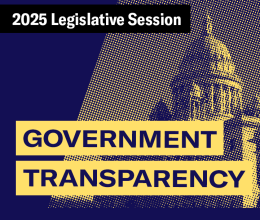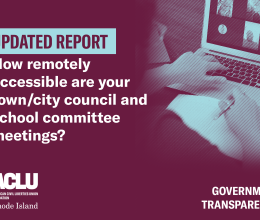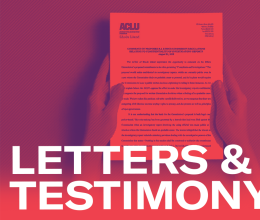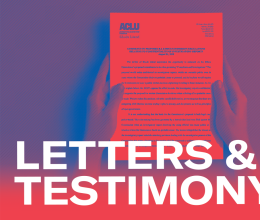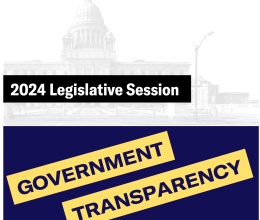The ACLU of Rhode Island today filed a “friend of the court” brief in support of state Representative Patricia Morgan’s request for a waiver of more than $4,000 in fees that the Attorney General is demanding in her quest for documents pertaining to the AG’s expenditure of more than $50M in funds from the “Google settlement.” The brief also asks the court to reject the basis offered by the AG for many redactions in the documents that have already been given to Morgan, who has thus far paid more than $3,700 for partial release of the records.
In supporting both the waiver of fees and fewer redactions, the ACLU’s brief called on the Court to “be guided by the unmistakable remedial purpose of APRA to promote transparency and accessibility to public records.”
The brief acknowledges that:
“While the request is broad, it is unquestionably directed to a matter of public interest directly focusing on the choices of the Attorney General as to how to spend large sums of money entrusted to that office which are subject to the requirements of the settlement. There can be little question about the strong public interest in a settlement which made millions of dollars available for public expenditure. With government and the public still saddled with fiscal responsibilities of poor government decision making in incidents like the 38 Studios debacle, the public interest in transparency in the disbursement and expenditure of such a huge sum by a state agency is undeniable.”
The brief, filed by ACLU of RI cooperating attorney Lynette Labinger, criticizes an argument by the AG that Morgan should be required to provide evidence of financial hardship or inability to pay for the requested records. Instead, the brief notes: “Even for a person of unlimited resources (and there is no evidence that Morgan is such a person), the imposition of a substantial expense in order to access public records serves as a deterrent where the APRA default clearly favors disclosure and eliminating barriers to open government.”
The brief also challenges the validity of numerous redactions made in the records already provided to Morgan. They include redactions made under the AG’s interpretation of APRA’s exemption for preliminary draft memoranda as justifying the withholding of any document that could be characterized as a “memorandum,” regardless of whether it is preliminary in nature.
The Attorney General further decided that “purchase order numbers” should be redacted, speculating that providing the numbers might permit a breach of its vendor system. However, the brief argues:
“Morgan quite convincingly has demonstrated that purchase order and contract numbers are useful and often necessary to ‘match up’ bids, awards, and contracts. Indeed, the Rhode Island Department of Administration (“DOA”), in its APRA request forms, has underscored the importance and utility of such information, specifically requesting inclusion of “Bid/RFP Number, Purchase Order Number, etc.” to facilitate retrieval.”
In calling on the Court to reject the AG’s arguments for redacting these pieces of information, the brief argues that the AG’s position “significantly, and unnecessarily, expands the redaction and non-disclosure of information in public records for no good purpose, and at the same time dramatically increases and passes along the costs for such redaction to the records requester.”
“The Attorney General’s argument here, if sustained, would invite each public agency to scour every record required to be produced in order to redact each number, word or sentence in an otherwise public document on the grounds that those snippets have no public interest. Under that theory, just about any document could face discretionary redactions when the public body concludes, for example, that the page numbers or closing courtesy line in a letter is of no public interest.”
The brief concludes by asking the Court to waive any fees for providing the records to Morgan, to limit the redactions involving memoranda and purchase order numbers and similar identifiers; to reproduce without those redactions the records previously provided her; and, “ in view of the Attorney General’s heavy hand in redaction,” to return to Morgan some or all of the fee previously tendered by her.
R.I. Superior Court Judge Melissa Long is scheduled to issue a ruling on Morgan’s request on Monday. Last week, the ACLU of RI issued a detailed analysis of the Attorney General’s position in the case, raising many of the points contained in the brief.



